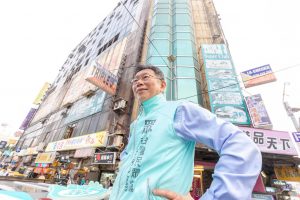Taiwan President Tsai Ing-wen notched a landslide victory over challenger Han Kuo-yu in the country’s elections on Saturday. But she wasn’t the night’s only big winner.
The Taiwan People’s Party (TPP), created last August by Taipei Mayor Ko Wen-je, gained five legislative seats after winning almost 1.6 million votes (11.2 percent) in Taiwan’s party list contest.
Months after Ko opted not to run for president after long hinting at an independent bid, his party is now Taiwan’s third largest, eclipsing the youth-oriented New Power Party (NPP) and other better-established parties like James Soong’s People’s First Party (PFP).
Ko has cast his TPP as an alternative to Tsai’s Democratic Progressive Party (DPP) and Han’s Kuomintang (KMT), along with smaller Pan-Green (DPP-affiliated) and Pan-Blue (KMT-affiliated) parties. To drive the idea home, the party’s color is a pale hue somewhere between turquoise and aqua – officially, it’s “blue-green.” (Ko had toyed with naming his party the “White Force,” which, in Chinese, sounds similar to the NPP and does not carry troubling connotations.)
What the party stands for, however, is only beginning to take shape.
On Monday, TPP legislator-at-large-elect Tsai Pi-ju said the party would form an opposition alliance with the KMT and NPP to monitor the ruling DPP, which retained its majority but lost some legislative seats. William Tseng, the KMT caucus whip, expressed openness to the idea the following day.
But Ko said on Tuesday Tsai Pi-ju’s comments were inaccurate, preferring to say the TPP intends to form a “people’s alliance.”
Ko – who is in Prague visiting Mayor Zdenek Hrib, who recently signed a sister city agreement with Taipei and ended one with Beijing – also refuted characterizations of his party as a member of the Pan-Blue camp and said the party should not be categorized by Taiwan’s blue-green divide.
Several incoming TPP legislators-at-large have potential associations with Pan-Blue figures. Ann Kao is the former big data head at Foxconn, the company founded by Terry Gou, who lost to Han in the KMT presidential primary and has since toyed with a political alliance with Ko. (Late last summer, reports indicated that Ko and Gou were interested in a joint independent bid or in supporting the other should he run for president. Both ultimately declined to run.) But TPP figures have also been pulled from the Pan-Green ranks.
The party’s current orientation thus mirrors Ko’s, which is infamously vague.
Ko, who became Taipei mayor in 2014 after the DPP tacitly backed him by declining to run its own challenger, received backlash for notoriously saying that “both sides of the Taiwan Strait are one family” – a comment seen by DPP figures as a rejection of their ideals of Taiwan independence. In 2018, Ko won re-election in a close race against a KMT and a DPP candidate.
Ko also pioneered city-to-city cross-strait exchanges with Chinese municipalities, a model that KMT mayors have since sought to emulate.
But Ko also rose to popularity due to the support of young, DPP-leaning voters. Politically, he has always steered clear of KMT orthodoxy, especially on cross-strait matters.
The TPP’s ultimate role in the legislature remains a mystery, but speculation that it will frequently ally with the KMT has a sound chance of coming to fruition. Tsai Pi-ju’s Monday comments hinted at a strategy of monitoring the DPP and differentiating itself from the legislative majority.
Unlike the NPP, which frequently allies with the DPP but stakes out more progressive stances, the TPP will likely seek moderate positions by criticizing the DPP should it move to pass legislation that is not supported outside of the core party base.
Ko, whose term as Taipei mayor ends at the end of 2022, will also see the TPP legislative presence as an opportunity to shape his own political agenda.
Ko likely chose not to enter the 2020 presidential race with knowledge he would not defeat a resurgent Tsai, who won a record 8.2 million votes and has held strong approval ratings since late summer.
He may have better prospects in 2024, although it is far too early to tell. The KMT is in the midst of an identity crisis as younger legislators call to moderate the party’s more Beijing-friendly voices.
In the DPP, Tsai will not be able to run again, having already served two terms as president. Vice President-elect and former Premier William Lai has been tipped for a run in 2024, but he has limited appeal in certain party factions and other DPP figures will surely maneuver to potentially enter the race.
For Ko and the TPP, the immediate challenge will be to establish a foothold in the legislature while delivering on promises to voters to be a moderating presence, rather than a new Pan-Blue party.

































